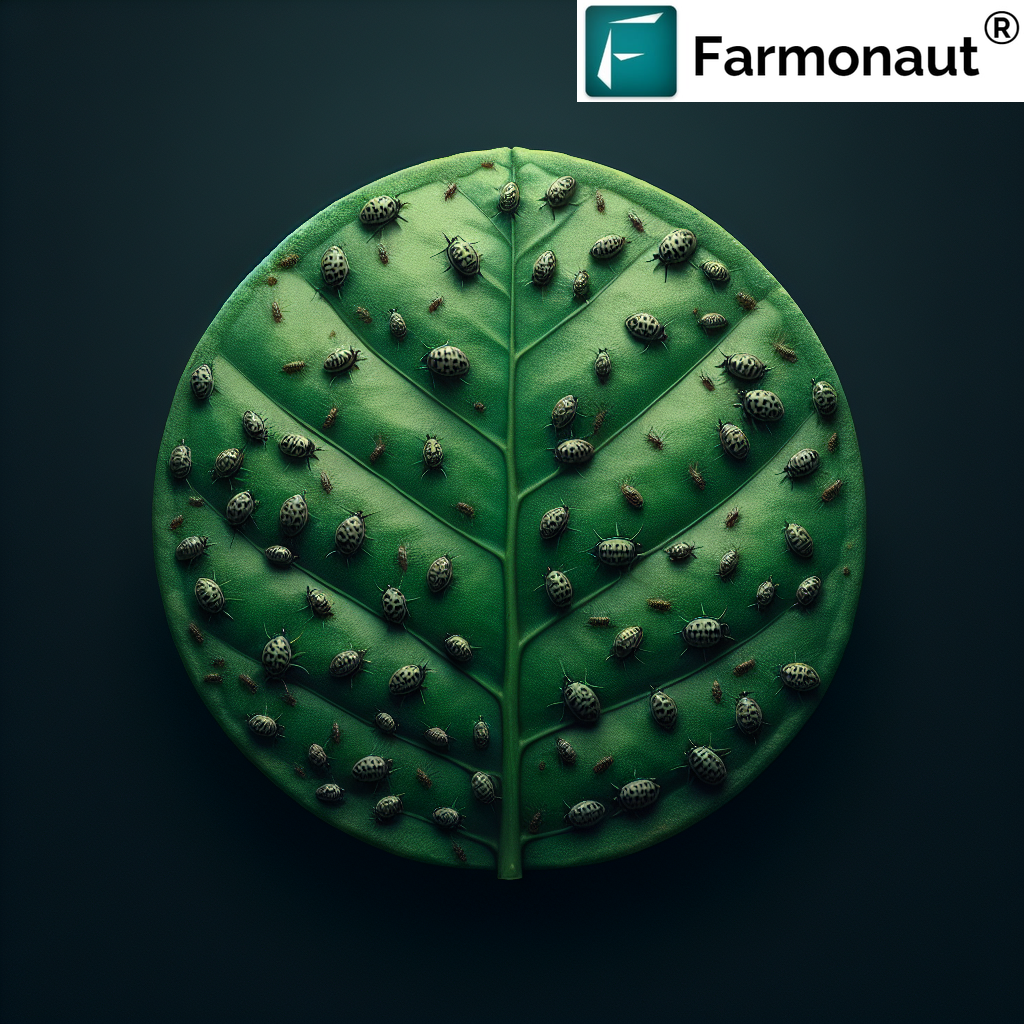Understanding and Combating Black Bugs on Citrus Leaves: A Comprehensive Guide

As agricultural technology experts at Farmonaut, we understand the challenges that citrus growers face, especially when it comes to pest management. One of the most common issues that citrus farmers encounter is the presence of black bugs on citrus leaves. These tiny pests can cause significant damage to your citrus trees if left unchecked. In this comprehensive guide, we’ll explore everything you need to know about identifying, preventing, and treating black bugs on your citrus trees.
Table of Contents
- Understanding Black Bugs on Citrus Leaves
- Identifying the Problem: Black on Citrus Leaves
- Common Types of Black Bugs Affecting Citrus Trees
- The Impact of Black Bugs on Citrus Health
- Prevention Strategies for Black Bugs
- Effective Treatment Methods
- Organic Solutions for Black Bug Control
- Chemical Treatments: When and How to Use Them
- Monitoring and Maintenance for Long-term Control
- How Farmonaut’s Technology Aids in Pest Management
- FAQs about Black Bugs on Citrus Leaves
1. Understanding Black Bugs on Citrus Leaves
When we talk about black bugs on citrus leaves, we’re typically referring to a variety of small, dark-colored insects that feed on citrus plants. These pests can range from aphids and scale insects to citrus leaf miners and black citrus aphids. Understanding the specific type of black bug affecting your citrus trees is crucial for implementing effective control measures.
2. Identifying the Problem: Black on Citrus Leaves
The presence of black on citrus leaves can be alarming for any citrus grower. However, it’s important to note that not all black substances on leaves are caused by insects. Sometimes, what appears to be black citrus leaves might actually be sooty mold, a fungal growth that develops on honeydew secreted by certain insects. To accurately identify the problem, look for these signs:
- Small, dark insects clustered on the undersides of leaves
- Sticky residue on leaves and branches
- Black, sooty coating on leaves
- Curling or distorted leaves
- Yellowing of leaves
- Premature leaf drop

3. Common Types of Black Bugs Affecting Citrus Trees
Several species of black bugs can infest citrus trees. Here are some of the most common culprits:
3.1 Black Citrus Aphids
These small, pear-shaped insects cluster on new growth and tender shoots. They suck sap from the plant, causing leaf distortion and stunted growth.
3.2 Citrus Black Flies
Also known as blackfly, these insects resemble tiny black moths and can quickly multiply, causing significant damage to citrus foliage.
3.3 Black Scale Insects
These small, oval-shaped insects attach themselves to leaves and branches, sucking sap and producing honeydew that leads to sooty mold growth.
3.4 Citrus Leaf Miners
While not black themselves, these tiny moth larvae create silvery trails on leaves that can turn black as the damaged tissue dies.
4. The Impact of Black Bugs on Citrus Health
The presence of black bugs on citrus leaves can have severe consequences for the health and productivity of your citrus trees. Some of the impacts include:
- Reduced photosynthesis due to leaf damage and sooty mold
- Stunted growth and reduced fruit production
- Weakened immune system, making trees more susceptible to diseases
- Premature fruit drop
- Reduced overall tree vigor
5. Prevention Strategies for Black Bugs
At Farmonaut, we believe that prevention is key to maintaining healthy citrus orchards. Here are some strategies to prevent black bug infestations:
5.1 Maintain Tree Health
Healthy trees are more resistant to pest infestations. Ensure proper watering, fertilization, and pruning practices.
5.2 Encourage Natural Predators
Create a habitat that attracts beneficial insects like ladybugs, lacewings, and parasitic wasps, which naturally control black bug populations.
5.3 Regular Monitoring
Implement a regular monitoring schedule to catch infestations early. Our Farmonaut app can help you track and monitor your orchard’s health efficiently.
5.4 Proper Sanitation
Remove fallen leaves and debris from around your citrus trees, as these can harbor pests and diseases.
6. Effective Treatment Methods
When prevention isn’t enough, and you find black bugs on citrus leaves, it’s time to take action. Here are some effective treatment methods:
6.1 Physical Removal
For small infestations, you can manually remove bugs or prune affected parts of the tree.
6.2 Horticultural Oils
Neem oil and other horticultural oils can effectively suffocate and control many types of black bugs.
6.3 Insecticidal Soaps
These are effective against soft-bodied insects like aphids and can be a good first line of defense.
6.4 Biological Control
Introducing natural predators or using microbial insecticides can help control black bug populations.
7. Organic Solutions for Black Bug Control
For those preferring organic methods, here are some natural solutions to combat black bugs on citrus leaves:
- Garlic and pepper spray: A homemade mixture can repel many pests
- Diatomaceous earth: Sprinkled around the base of trees, it can deter crawling insects
- Companion planting: Certain plants like marigolds can repel pests
- Kaolin clay: This fine powder coats leaves and deters insects from feeding
8. Chemical Treatments: When and How to Use Them
While we at Farmonaut advocate for sustainable and organic practices, sometimes chemical interventions are necessary for severe infestations. Here’s what you need to know:
8.1 When to Consider Chemical Treatments
Consider chemical options when organic methods have failed, and the infestation threatens the survival of your trees.
8.2 Types of Chemical Treatments
Systemic insecticides, foliar sprays, and soil drenches are common chemical treatments for black bugs.
8.3 Safety Precautions
Always follow label instructions, wear protective gear, and be mindful of beneficial insects and the environment when using chemical treatments.
9. Monitoring and Maintenance for Long-term Control
Ongoing monitoring and maintenance are crucial for long-term control of black bugs on citrus leaves. Here’s how to keep your citrus trees healthy:
- Regular inspections: Check your trees at least weekly for signs of pests
- Proper pruning: Remove dead or diseased branches to improve air circulation
- Balanced nutrition: Ensure your trees receive proper nutrients to boost their natural defenses
- Soil health: Maintain healthy soil with proper pH and organic matter content
10. How Farmonaut’s Technology Aids in Pest Management
At Farmonaut, we’re committed to helping farmers manage their orchards more effectively. Our satellite-based technology offers several advantages in pest management:
10.1 Early Detection
Our satellite imagery can detect changes in plant health before they’re visible to the naked eye, allowing for early intervention against pest infestations.
10.2 Precise Monitoring
Our API provides detailed vegetation health indices, helping you identify problem areas quickly.
10.3 Data-Driven Decision Making
With our AI-powered insights, you can make informed decisions about when and where to apply pest control measures.
10.4 Integrated Pest Management Support
Our platform supports integrated pest management strategies by providing comprehensive data on crop health, weather patterns, and pest prevalence.
| Feature | Farmonaut Satellite System | Drone-based Monitoring | IoT-based Monitoring |
|---|---|---|---|
| Coverage Area | Large scale (Hundreds to thousands of acres) | Limited (Few acres per flight) | Limited (Depends on sensor placement) |
| Frequency of Data Collection | Regular (Every few days) | On-demand (Requires manual flights) | Continuous (But localized) |
| Cost-effectiveness | High (No hardware investment required) | Medium (Requires drone purchase and pilot) | Low (High initial investment in sensors) |
| Data Processing | Automated with AI | Often requires manual processing | Automated but limited to sensor locations |
| Weather Independence | High (Can penetrate clouds) | Low (Affected by wind and rain) | Medium (Some sensors affected by weather) |
To get started with Farmonaut’s advanced pest management tools, download our app for Android or iOS.
11. FAQs about Black Bugs on Citrus Leaves
Q1: How quickly can black bugs damage my citrus trees?
A: The speed of damage can vary, but severe infestations can cause noticeable damage within a few weeks.
Q2: Can black bugs on citrus leaves spread to other plants?
A: Yes, many black bugs can spread to other citrus trees and sometimes to other plant species in your garden.
Q3: How often should I treat my citrus trees for black bugs?
A: Treatment frequency depends on the severity of the infestation. For prevention, monthly checks and treatments during growing seasons are often sufficient.
Q4: Are there any natural predators that can help control black bugs on citrus leaves?
A: Yes, ladybugs, lacewings, and parasitic wasps are natural predators that can help control black bug populations.
Q5: Can black bugs on citrus leaves affect fruit quality?
A: Yes, severe infestations can lead to reduced fruit size, quality, and even premature fruit drop.
Q6: How can Farmonaut’s technology help me manage black bug infestations?
A: Our satellite-based monitoring system can detect early signs of stress in your citrus trees, allowing for timely intervention before infestations become severe. Learn more about our API documentation for developers.
Conclusion
Managing black bugs on citrus leaves requires a combination of vigilance, prevention, and timely intervention. By understanding the types of pests you’re dealing with and implementing a comprehensive management strategy, you can keep your citrus trees healthy and productive. Remember, early detection is key, and that’s where Farmonaut’s advanced satellite technology can give you a significant advantage.
Don’t let black bugs threaten your citrus harvest. Take control of your orchard’s health with Farmonaut’s cutting-edge farm management solutions. Subscribe to our services today and experience the power of precision agriculture at your fingertips.
By leveraging our satellite technology and AI-powered insights, you’ll be better equipped to tackle not just black bugs, but a wide range of agricultural challenges. Join the Farmonaut community today and take your citrus farming to the next level!